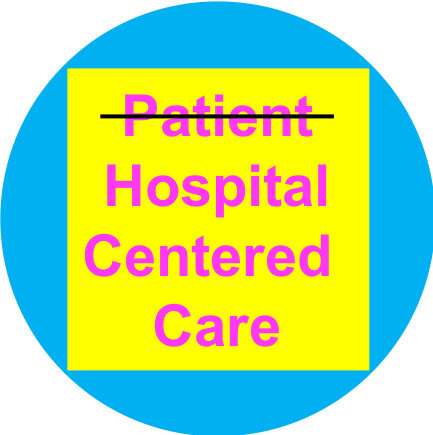Tag: billing
Hospital centered care
 Healthcare decisions are increasingly driven by efficiency and economic factors, even at the end of life. This was brought home to me several months ago with my mother’s death after a short hospitalization for a lung infection.
Healthcare decisions are increasingly driven by efficiency and economic factors, even at the end of life. This was brought home to me several months ago with my mother’s death after a short hospitalization for a lung infection.
Because I was planning to be on vacation during the time of her hospitalization, I was able to be at her side pretty much full time, allowing me a front row seat to a series of decisions that were based on efficiency and hospital reputation rather than patient care.
Our insurance mess
 A few months ago, I read the horrifying story in the New York Times written by a physician, Aaron Carroll entitled “Trapped in the System: A Sick Doctor’s Story”, about how difficult it was for him to get his prescription filled. At the time I joked with my husband that the story didn’t sound that bad to me. My daughter has been taking “specialty drugs” (expensive drugs that are used to treat complicated medical problems like cancer, rheumatoid arthritis and multiple sclerosis) for several years and we have had many frustrating experiences, especially trying to figure out the medical bills. Her recent switch to a new specialty drug has caused the biggest problems yet.
A few months ago, I read the horrifying story in the New York Times written by a physician, Aaron Carroll entitled “Trapped in the System: A Sick Doctor’s Story”, about how difficult it was for him to get his prescription filled. At the time I joked with my husband that the story didn’t sound that bad to me. My daughter has been taking “specialty drugs” (expensive drugs that are used to treat complicated medical problems like cancer, rheumatoid arthritis and multiple sclerosis) for several years and we have had many frustrating experiences, especially trying to figure out the medical bills. Her recent switch to a new specialty drug has caused the biggest problems yet.
Most insurance plans use other companies, called pharmacy benefit managers or PBMs, to manage prescription drugs. And PBMs use companies called “specialty pharmacies” (often owned by them) to manage specialty drugs, which are a key factor in driving up healthcare costs.
Are we in Belarus?
 I spent much of last week trying to sort out the bills for the medication my daughter receives by infusion every 2 months. I’ve written before about the facility fees that many hospitals charge patients to inflate their bills and about how hospital bills are impossible for patients to understand. Because the facility fees doubled our out-of-pocket expenses, we applied to a program run by the pharmaceutical company, that reimburses patients for up to $6000 per year for drug costs.
I spent much of last week trying to sort out the bills for the medication my daughter receives by infusion every 2 months. I’ve written before about the facility fees that many hospitals charge patients to inflate their bills and about how hospital bills are impossible for patients to understand. Because the facility fees doubled our out-of-pocket expenses, we applied to a program run by the pharmaceutical company, that reimburses patients for up to $6000 per year for drug costs.
The drug company program requires that the patient send copies of the Explanation of Benefits (EOB) from the insurance company along with the bill from the hospital after each infusion. Unfortunately, neither the insurance company nor the hospital includes the name of the drug in their paperwork so the reimbursement was denied by the drug company. After many attempts I was able to get an itemized bill from the hospital (although they made it clear that I would have to call each time I needed one in the future). The reimbursement for one infusion was finally issued – but it was put on a Mastercard that could only be used for payment of future infusions. After many weeks, I finally found a person in the infusion center who agreed to help me figure out how to spend the money that was already on the Mastercard.
Making patients pay more
Medical bills are not designed to make sense to the patient. In fact, as I’ve written before, they are almost impossible to understand, even when the charges are explained by the billing office.
So it’s pretty easy for hospitals to add charges to the bill without the patient really knowing. One popular way is to add a “facility fee”.
My daughter in on a medication that is given once every 2 months. She goes to the doctors’ office building that is connected to an academic medical center where the medication is given through an IV over the course of a few hours. The staff members in the infusion center know her well and her doctor often stops by to say hello while she is there.
Patient centered billing
 My husband and I returned from a weekend away to find a message on our answering machine saying that we owed money to the hospital and that if we didn’t pay it within 10 days, they would send the bill to a collection agency. The message was left on Saturday night and the automated voice said the charges were for cardiology services for our daughter.
My husband and I returned from a weekend away to find a message on our answering machine saying that we owed money to the hospital and that if we didn’t pay it within 10 days, they would send the bill to a collection agency. The message was left on Saturday night and the automated voice said the charges were for cardiology services for our daughter.
Our initial thought was that this was a mistake because: 1) our daughter had not been seen by a cardiologist and 2) we have paid all our bills.